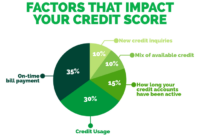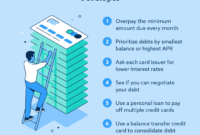How to use credit cards responsibly takes center stage in this comprehensive guide, offering valuable insights and practical tips for managing your finances effectively.
Understanding the nuances of credit card usage is crucial in today’s financial landscape, and this article aims to equip you with the knowledge needed to navigate this terrain with confidence.
Understand Credit Cards
Credit cards are payment cards issued by financial institutions that allow consumers to borrow money for purchases. When using a credit card, you are essentially borrowing money from the card issuer, with the agreement that you will pay back the borrowed amount along with any applicable interest and fees within a specified timeframe.
Types of Credit Cards
- Standard Credit Cards: These are basic credit cards that offer a line of credit to cardholders to make purchases.
- Rewards Credit Cards: These cards offer rewards, such as cash back, points, or miles, for every purchase made using the card.
- Secured Credit Cards: Secured cards require a security deposit, which serves as collateral, and are typically used by individuals with no credit history or poor credit.
- Balance Transfer Credit Cards: These cards allow you to transfer existing credit card balances to a new card with a lower interest rate.
- Student Credit Cards: Designed for college students, these cards offer lower credit limits and are a way to build credit history.
Benefits and Risks of Credit Cards
- Benefits:
- Convenience: Credit cards offer a convenient way to make purchases online and in-store without carrying cash.
- Rewards: Many credit cards offer rewards such as cash back, points, or miles for every purchase made.
- Build Credit: Responsible use of credit cards can help build a positive credit history, which is important for future financial endeavors.
- Risks:
- Debt Accumulation: If not managed properly, credit card usage can lead to high levels of debt due to interest charges.
- Interest Rates: Credit cards often come with high-interest rates, which can add up quickly if the balance is not paid in full each month.
- Fees: Late payment fees, annual fees, and other charges can increase the cost of using credit cards.
Responsible Credit Card Usage
Using credit cards responsibly is crucial to maintaining good financial health and avoiding debt. Here are some tips to help you use your credit cards wisely:
Make Timely Payments
One of the most important aspects of responsible credit card usage is making timely payments on your credit card bills. By paying your bills on time, you can avoid late fees, penalty interest rates, and negative impacts on your credit score.
Obtain recommendations related to How to become a successful forex trader that can assist you today.
Maintain a Low Credit Utilization Ratio
Your credit utilization ratio is the amount of credit you are using compared to the total amount of credit available to you. It is recommended to keep your credit utilization ratio below 30% to show lenders that you can manage credit responsibly. High credit utilization can negatively impact your credit score.
Budgeting and Tracking Expenses: How To Use Credit Cards Responsibly

Creating a budget and tracking expenses are essential components of responsible credit card usage. By setting limits on spending and monitoring where your money goes, you can avoid overspending and manage your finances effectively.
Creating a Budget
One effective way to manage credit card spending is to create a monthly budget. Start by calculating your total monthly income and fixed expenses, such as rent, utilities, and loan payments. Allocate a portion of your income for variable expenses like groceries, entertainment, and credit card payments. Make sure to set aside savings as well to build your emergency fund.
Importance of Tracking Expenses
Tracking your expenses is crucial to staying within your budget and avoiding overspending. Use budgeting apps or spreadsheets to categorize your expenses and compare them to your budgeted amounts. This will help you identify areas where you may be overspending and make adjustments accordingly.
Analyzing Credit Card Statements
- Review your credit card statements regularly to track your spending patterns and identify any unauthorized charges.
- Check for any discrepancies between your receipts and the charges on your statement.
- Pay attention to interest charges, late fees, and other penalties that may impact your overall balance.
- Utilize online banking tools to set up alerts for large transactions or unusual spending activity.
Building and Maintaining Good Credit

Responsible credit card usage plays a crucial role in building and maintaining a good credit score. By using credit cards wisely, individuals can demonstrate their ability to manage credit responsibly, which can positively impact their credit score over time.
Strategies for Improving and Maintaining a Healthy Credit Score, How to use credit cards responsibly
- Pay your bills on time: Timely payments are one of the most important factors in determining your credit score. Make sure to pay at least the minimum amount due by the due date to avoid late payments.
- Keep credit card balances low: Try to keep your credit card balances low in relation to your credit limit. High credit utilization can negatively impact your credit score.
- Avoid opening multiple new accounts at once: Opening several new credit accounts within a short period can lower the average age of your accounts and potentially harm your credit score.
- Monitor your credit report regularly: Check your credit report for errors or inaccuracies that could be negatively affecting your score. Dispute any discrepancies and ensure that your credit report is up to date.
- Use different types of credit: Having a mix of credit accounts, such as credit cards, loans, and mortgages, can show lenders that you can manage different types of credit responsibly.
Factors that Can Impact Credit Scores Positively and Negatively
- Positive Factors:
- Timely payments
- Low credit utilization
- Long credit history
- Diverse credit mix
- Negative Factors:
- Late payments
- High credit card balances
- Multiple new credit inquiries
- Accounts in collections
By following the strategies Artikeld in this guide, you can establish a solid foundation for responsible credit card usage, paving the way for financial stability and a healthy credit score. Remember, informed decisions today lead to a brighter financial future tomorrow.



